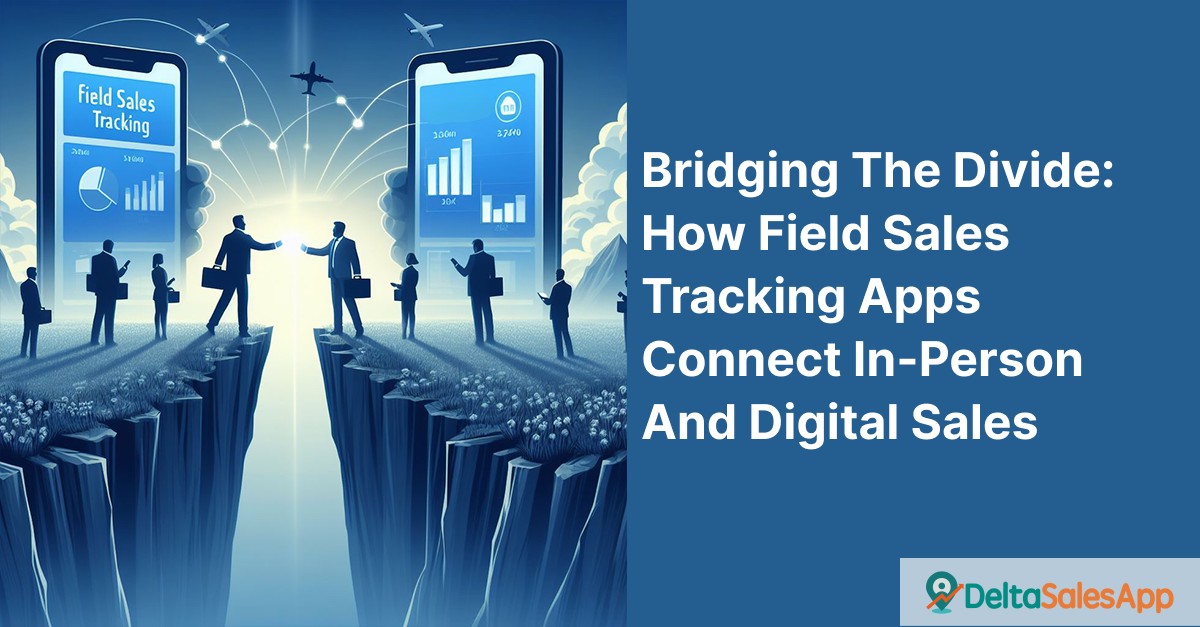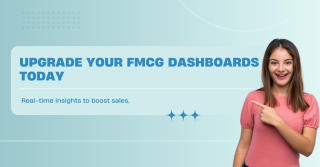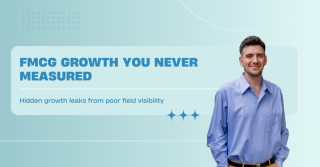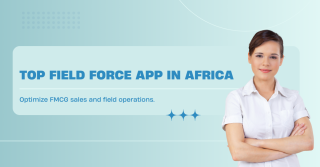Bridging the Divide: How Field Sales Tracking Apps Connect In-Person and Digital Sales

The complex dance between in-person and digital sales is a high-stakes tango for businesses. The pandemic jolted many into a sudden shift towards digital, highlighting both its efficiencies and the shortcomings of the personal touch. Field sales, once the bastion of personal connections and handshake deals, is now in a transitional phase, looking to merge traditional methods with the power of digital interfaces. The solution lies not in choosing one over the other but in finding a seamless integration that leverages the strengths of both.
Understanding the divide
Traditional Field Sales
The old school of field sales is grounded in personal relationships and physical product demonstrations. It's a world where the salesperson is the product expert and the customer's home or office serves as the showroom. Stacks of business cards and hand-written notes form the backbone of CRM, and sales strategies rely on the salesperson's intuition and experience.
Digital Sales
On the other side of the coin, digital sales operate in the ether, with more data analytics and less pressing of flesh. Online platforms, e-commerce, email campaigns, and chat support modules are the tools of the trade. Here, big data and automation guide sales strategies and customer interactions, often with little to no face-to-face contact.
Advantages and disadvantages
Each approach has its advantages. Traditional field sales leverage human connections, building rapport and trust quickly. It allows for personalization that can be tough to replicate in the virtual world. However, it's also costlier and less data-driven. Digital sales, while more efficient and scalable, can struggle to establish the deep relationships that traditional field sales do.
The Role of Field Sales Tracking Apps
Field sales tracking apps are the bridge over the divide between in-person and digital sales. They aim to combine the mobility and personal touch of field sales with the data capture and analysis capabilities of digital sales. These apps offer features like location tracking, order processing on-the-go, customer feedback collection, and real-time inventory monitoring.
Integration and efficiency
The beauty of these apps lies in their ability to sync sales and customer data across all platforms, eliminating silos and consolidating information. This not only empowers sales teams with comprehensive customer profiles but also ensures that no sales lead or opportunity is missed due to disparate systems.
Customer Engagement
Apps equipped with CRM functionalities enable sales reps to create and nurture customer relationships, even when they are miles apart. Automated reminders for follow-ups, personalized offers, and a history of past interactions help maintain a personal touch within the digital sphere.
Benefits for Businesses
Enhanced Productivity
Field sales tracking apps can significantly boost the productivity of your sales team. By streamlining processes, automating tasks, and providing resources at their fingertips, reps spend less time on administrative work and more time selling.
Better customer insights
The integration of digital and field sales data provides businesses with a holistic view of customer behavior and preferences. This valuable insight enables better, more targeted sales strategies and product development that align with customer demands.
Improved Sales Performance
Real-time data and analytics from sales tracking apps offer a clear understanding of sales performance metrics, allowing for quick adjustments to strategies and more informed decision-making. Improved performance tracking can lead to better sales results and a higher ROI.
Best Practices
Choosing the Right App
Selecting the right field sales tracking app is crucial. It should be easy to use, offer robust features, and be scalable as your business grows. Customizability to fit your sales process is also key, as not all sales processes are created equal.
Implementing Effectively
An app is only as good as its implementation. Detailed training and a phased roll-out can ensure the app is embraced and utilized effectively by your sales team.
Strategic Planning
Before rolling out an app, it's important to have a strategic plan in place. Identify your sales team's pain points and how the app can address them. Set clear KPIs to measure success and communicate these with the team.
The Future of Sales
The meshing of personal sales and digital interfaces is an ongoing evolution. The future seems to lean towards a hybrid model, where the strengths of both traditional and digital sales are leveraged harmoniously. Predictive analytics and AI will play a more prominent role in personalizing the sales experience without losing the human touch. Mobile apps for sales will become more sophisticated, offering a level of convenience and power currently unrealized.
Conclusion
The marriage between field sales tracking apps and the in-person sales experience is one with vast potential to redefine the sales landscape. Businesses that understand and appreciate the unique advantages each approach offers and can combine them effectively are the ones poised for growth and success. It’s not about replacing the old with the new, but about integrating the two to create a sales superpower that connects with customers on their terms. In this challenging but exciting era, the companies that manage to bridge that divide will not just survive but thrive in the new normal of the business world.
FAQs
Q: What are some essential features to look for in a field sales tracking app?
A: When selecting a field sales tracking app, prioritize features like real-time location tracking, seamless integration with CRM platforms, comprehensive analytics and reporting tools, and mobile order processing capabilities. The goal is to enhance productivity, improve customer engagement, and gain actionable insights.
Q: How can businesses ensure the successful implementation of a field sales tracking app?
A: Successful implementation hinges on comprehensive training programs for the sales team, clear communication of the app's benefits, and a phased roll-out strategy to mitigate resistance. Continuous support and feedback mechanisms are also vital to address any issues promptly and ensure the app's effective use.
Q: Can field sales tracking apps be integrated with existing business systems?
A: Yes, most modern field sales tracking apps offer robust integration capabilities with existing business systems, including e-commerce platforms, CRM software, and ERP systems. This ensures a unified data ecosystem, enhances efficiency, and provides a 360-degree view of customer interactions.
Q: How do these apps enhance customer engagement?
A: These apps enable sales reps to access detailed customer profiles, including historical data and past interactions, ensuring personalized and informed customer interactions. Features like automated follow-up reminders and personalized promotions contribute to a more engaged and satisfied customer base.









